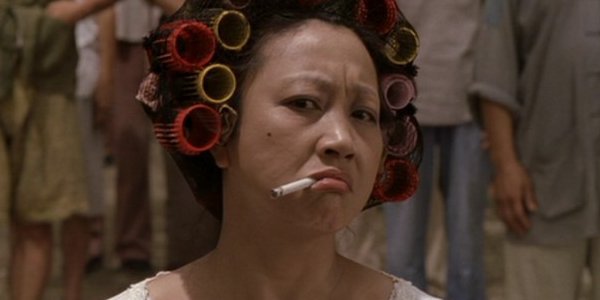Movie review by Greg Carlson
Stephen Chow’s “Kung Fu Hustle” is surely one of contemporary cinema’s finest examples of innovatively and effectively integrated CGI. Unlike Lucas’ soul-crushing “Star Wars” prequel juggernauts, as well as the “Matrix” series, Chow recognizes the vast, nearly untapped comic potential of pixel-bound nonsense. Totally unafraid to attempt any kind of jaw-droppingly goofy sight gag, Chow’s universe is completely comfortable in its ability to channel the kind of gravity defying impossibilities perfected by masters like Tex Avery. “Kung Fu Hustle” announces itself as a parody, but Chow’s skillful storytelling, along with his genuine reverence for past masters, makes the film one of the most entertaining of the year.
Set in a fairy-tale past suggesting the 1940s, Chow’s film kicks things off with a dazzling opening sequence that introduces the audience to the Axe Gang, a legion of dapper, tuxedoed thugs who break into choreographed dance routines upon completion of their grisly business. Two desperate wannabes (director Chow and Lam Tze Chung), posing as members of the Axes, draw the gang’s attention to Pig Sty Alley, a marvelously designed tenement, which also happens to be home to several former kung fu masters who can more than handle themselves in a fight. Pig Sty Alley serves as the primary setting for a heart-stopping run of tasty battles, and Chow stages the numerous clashes with reckless, delirious abandon.
Every clever confrontation in “Kung Fu Hustle” contains as much humor as it does impressive combat, which should satisfy genre fans who like to laugh. Not wanting to skimp on the wow factor, Chow enlisted the brilliant Yuen Wo Ping to design the skirmishes, and the legendary fight director delivers some of the finest displays of his career. Chow’s cast, which includes several legendary performers, is nearly perfect, and Yuen Qiu, as a chain-smoking landlady in curlers, slippers, and a housecoat, steals the movie with her exquisite deadpan expressions and her ability to deliver a serious beating.
Chow’s intertextual stew doesn’t stop with Avery cartoons, as “Kung Fu Hustle” nods in the direction of Sergio Leone, Fred Astaire, “Gangs of New York,” and “The Shining,” just to name a few. Amidst all the pop culture references, Chow still finds time to weave in a dewy romantic subplot involving his character and a mute childhood sweetheart (Huang Sheng Yi) who runs an ice cream cart as a grown-up. Despite being filled in with flashbacks, Chow’s nostalgic reverie needs a little more development to work as a full-fledged component of the movie, but it is hard to deny the charisma of the attractive lovebirds.
Chow leaves no doubt, however, that the visuals are the chief attraction, and his vivid style makes for some memorable imagery: giant palm prints stamp the earth, musical instruments send out hellish banshees that lop off heads and slice cats in two, and bodies stretch and twist like Reed Richards and Eel O’Brian. With so much on display, the most enjoyable aspect of the movie comes from the giddy realization that anything can happen (and often does). With “Kung Fu Hustle,” Chow cements his place as a sensational moviemaker. His admirers will wait eagerly to see what he does next.
